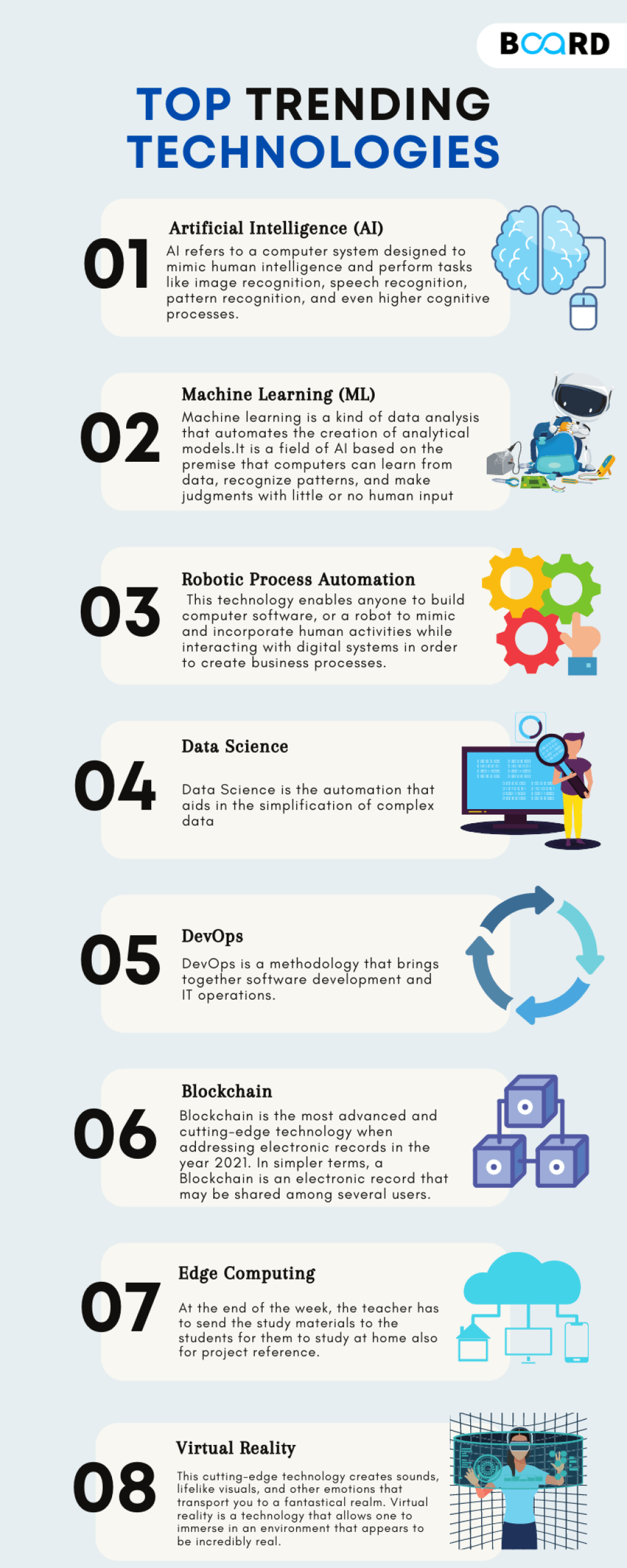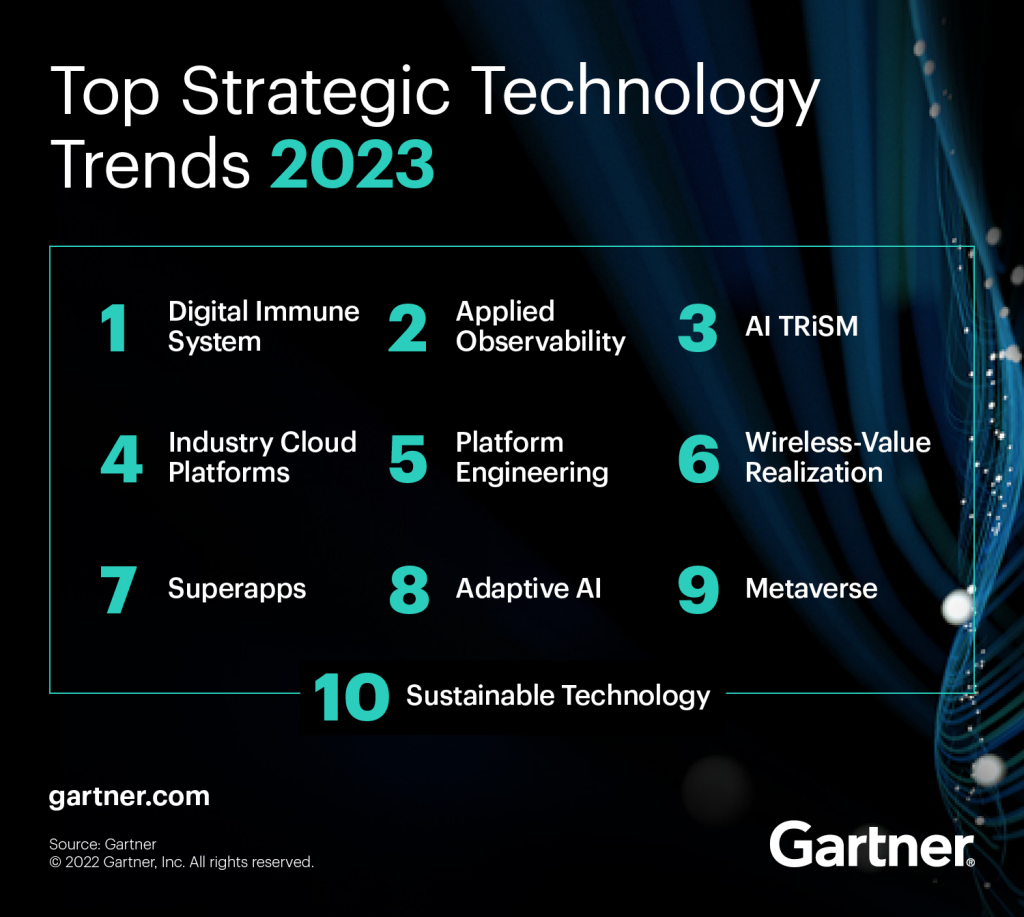Discover The Top 10 Latest Technology Trends: Stay Ahead With Cutting-Edge Innovations!
10 Latest Technology Trends
Introduction
Dear Readers,
2 Picture Gallery: Discover The Top 10 Latest Technology Trends: Stay Ahead With Cutting-Edge Innovations!


Welcome to our article on the 10 latest technology trends that are shaping the future! In today’s fast-paced world, technology continues to evolve at an astonishing rate, revolutionizing various industries and transforming the way we live and work. In this article, we will explore the top 10 trends that are currently making waves in the tech world. From artificial intelligence to blockchain, these trends are set to have a significant impact on our lives in the coming years. So, let’s dive in and discover the exciting world of technology!
1. Artificial Intelligence (AI) 🤖

Image Source: cloudinary.com
Artificial Intelligence, or AI, has been one of the most talked-about technology trends in recent years. It refers to the development of computer systems that can perform tasks that would normally require human intelligence. AI is being used in various sectors, including healthcare, finance, and transportation, to streamline processes, improve decision-making, and enhance overall efficiency.
What is Artificial Intelligence?
Artificial Intelligence is a branch of computer science that focuses on creating intelligent machines capable of performing tasks that typically require human intelligence.
Who is Using Artificial Intelligence?
Many tech giants, such as Google, Amazon, and Microsoft, are heavily investing in AI research and development. Additionally, industries like healthcare, finance, and transportation are embracing AI to improve their services and operations.
When Will Artificial Intelligence Impact Our Lives?

Image Source: gcom.cloud
Artificial Intelligence is already making an impact in various industries, and its influence is expected to grow exponentially in the coming years. As technology continues to advance, AI will become increasingly integrated into our daily lives.
Where is Artificial Intelligence Being Applied?
AI is being applied in a wide range of industries, including healthcare (assisting in diagnosing diseases), finance (automating trading processes), and transportation (developing autonomous vehicles).
Why is Artificial Intelligence Important?
AI has the potential to revolutionize numerous industries by enhancing productivity, improving decision-making, and enabling the development of innovative solutions to complex problems.
How Does Artificial Intelligence Work?
Artificial Intelligence works by utilizing algorithms and statistical models to analyze vast amounts of data and make predictions or decisions based on that analysis.
2. Internet of Things (IoT) 🌐
The Internet of Things, or IoT, refers to the network of physical devices, vehicles, appliances, and other objects embedded with sensors, software, and connectivity, enabling them to collect and exchange data. This interconnectedness allows for seamless communication and automation, making our lives more convenient and efficient.
What is the Internet of Things?
The Internet of Things is a network of interconnected physical devices that communicate with each other and share data, making our daily lives more connected and convenient.
Who is Using the Internet of Things?
Companies across various industries, such as healthcare, manufacturing, and agriculture, are utilizing the Internet of Things to optimize operations, improve efficiency, and enhance customer experiences.
When Will the Internet of Things Become Ubiquitous?
The Internet of Things is already becoming increasingly prevalent in our lives, with the number of connected devices growing exponentially. As technology continues to advance, the IoT is expected to become even more widespread.
Where is the Internet of Things Being Applied?
The Internet of Things is being applied in various sectors, including healthcare (remote patient monitoring), manufacturing (smart factories), and agriculture (precision farming).
Why is the Internet of Things Important?
The Internet of Things has the potential to transform industries and improve our daily lives by enabling automation, optimizing processes, and enhancing decision-making based on real-time data.
How Does the Internet of Things Work?
The Internet of Things works by connecting devices through sensors and enabling them to collect and exchange data, which can then be analyzed and used to make informed decisions or trigger automated actions.
3. Blockchain ⛓️
Blockchain is a decentralized digital ledger that records transactions across multiple computers. It provides a secure and transparent way of storing and verifying data, making it ideal for applications such as cryptocurrencies, supply chain management, and identity verification.
What is Blockchain?
Blockchain is a decentralized digital ledger that records transactions securely and transparently across multiple computers.
Who is Using Blockchain?
Blockchain technology is being utilized by various industries, including finance (for cryptocurrency transactions), supply chain management (for traceability and transparency), and healthcare (for secure data sharing).
When Will Blockchain Revolutionize Industries?
Blockchain is already revolutionizing industries such as finance, and its impact is expected to expand further as more organizations recognize its potential and adopt it into their operations.
Where is Blockchain Being Applied?
Blockchain is being applied in sectors such as finance (for secure and efficient transactions), supply chain management (for tracking and verifying goods), and healthcare (for secure patient data management).
Why is Blockchain Important?
Blockchain technology offers enhanced security, transparency, and efficiency, which can help eliminate fraud, reduce costs, and increase trust in various industries.
How Does Blockchain Work?
Blockchain works by creating a decentralized network of computers (nodes) that validate and record transactions in chronological order. Each transaction, or block, is linked to the previous one, forming a chain.
4. Virtual Reality (VR) and Augmented Reality (AR) 🕶️
Virtual Reality and Augmented Reality are immersive technologies that provide users with interactive virtual experiences. VR takes users into a completely virtual world, while AR overlays virtual elements onto the real world, enhancing our perception and interaction with our surroundings.
What is Virtual Reality?
Virtual Reality creates a simulated environment that users can interact with, often through the use of specialized headsets and controllers.
Who is Using Virtual Reality?
Virtual Reality is being embraced by various industries, including gaming, entertainment, education, and healthcare, to provide immersive experiences and training simulations.
When Will Virtual Reality Become Mainstream?
Virtual Reality is already gaining popularity, with more affordable and accessible devices available in the market. As the technology continues to advance and become more user-friendly, it is expected to become mainstream in the coming years.
Where is Virtual Reality Being Applied?
Virtual Reality is being applied in numerous sectors, including gaming (providing immersive gameplay experiences), education (creating interactive learning environments), and healthcare (assisting in pain management and therapy).
Why is Virtual Reality Important?
Virtual Reality has the potential to revolutionize industries by providing immersive experiences, enhancing training simulations, and creating new forms of entertainment and communication.
How Does Virtual Reality Work?
Virtual Reality works by creating a three-dimensional, computer-generated environment that users can interact with using specialized headsets and controllers.
5. 5G Technology 📶
5G technology is the next generation of wireless communication, offering faster speeds, lower latency, and higher capacity than its predecessors. This technology will enable the development of advanced applications such as autonomous vehicles, remote surgeries, and smart cities.
What is 5G Technology?
5G technology is the fifth generation of wireless communication, providing faster speeds, lower latency, and higher capacity compared to previous generations.
Who is Using 5G Technology?
Telecommunication companies, device manufacturers, and various industries are adopting 5G technology to enable faster and more reliable connections for a wide range of applications.
When Will 5G Technology be Widely Available?
5G technology is already being deployed in many regions, and its availability is expected to increase in the coming years as telecommunication companies continue to roll out infrastructure upgrades.
Where is 5G Technology Being Applied?
5G technology is being applied in various sectors, including telecommunications (providing faster and more reliable connections), autonomous vehicles (enabling real-time communication), and healthcare (enabling remote surgeries).
Why is 5G Technology Important?
5G technology has the potential to revolutionize industries by enabling faster and more reliable communication, supporting the development of advanced applications, and enhancing overall connectivity.
How Does 5G Technology Work?
5G technology works by utilizing higher-frequency bands and advanced network infrastructure to enable faster data transmission and lower latency.
6. Cloud Computing ☁️
Cloud computing refers to the delivery of computing services, including storage, servers, databases, software, and analytics, over the internet. It provides organizations with flexible and scalable solutions, reducing the need for physical infrastructure and enabling remote access to resources.
What is Cloud Computing?
Cloud computing is the delivery of computing services over the internet, allowing users to access and utilize resources such as storage and software remotely.
Who is Using Cloud Computing?
Organizations of all sizes and across various industries are using cloud computing to streamline operations, reduce costs, and improve scalability.
When Will Cloud Computing Become the Norm?
Cloud computing is already widely adopted, and its usage is expected to continue growing as organizations recognize the benefits of scalability, cost savings, and remote accessibility.
Where is Cloud Computing Being Applied?
Cloud computing is being applied in various sectors, including business (to store and process data), education (to facilitate remote learning), and government (to enhance efficiency and collaboration).
Why is Cloud Computing Important?
Cloud computing offers numerous advantages, including cost savings, scalability, and remote accessibility, enabling organizations to leverage advanced technologies without heavy upfront investments.
How Does Cloud Computing Work?
Cloud computing works by storing and processing data on remote servers, which can be accessed and utilized over the internet. This eliminates the need for organizations to maintain their own physical infrastructure.
7. Cybersecurity 🔒
Cybersecurity refers to the practice of protecting computers, servers, networks, and data from unauthorized access, theft, and damage. As technology advances, the importance of cybersecurity becomes increasingly critical to safeguard sensitive information and prevent cyber threats.
What is Cybersecurity?
Cybersecurity involves the practices and technologies used to protect computers, networks, and data from unauthorized access and cyber threats.
Who Needs Cybersecurity?
Every individual and organization that uses computers, networks, and the internet needs cybersecurity to protect their sensitive information from cybercriminals.
When Will Cybersecurity Become More Important?
Cybersecurity is already of utmost importance, and its significance will only continue to grow as technology becomes more integrated into our daily lives and cyber threats become more sophisticated.
Where is Cybersecurity Being Implemented?
Cybersecurity measures are implemented in various sectors, including finance (to protect financial transactions), healthcare (to secure patient data), and government (to safeguard classified information).
Why is Cybersecurity Important?
Cybersecurity is crucial to protect sensitive information, prevent financial losses, maintain trust in digital systems, and ensure the overall stability of the digital world.
How Does Cybersecurity Work?
Cybersecurity works by implementing a combination of preventive measures, such as firewalls and encryption, as well as detection and response mechanisms to identify and mitigate cyber threats.
Advantages and Disadvantages of the 10 Latest Technology Trends
Advantages
1. Increased efficiency and productivity in various industries.
2. Improved decision-making based on real-time data and analytics.
3. Enhanced convenience and connectivity in everyday life.
4. Creation of new job opportunities in emerging technology fields.
5. Streamlined processes and reduced costs for businesses.
Disadvantages
1. Potential job displacement due to automation and AI advancements.
2. Privacy concerns regarding the collection and use of personal data.
3. Cybersecurity risks and the potential for data breaches.
4. Digital divide and unequal access to technology in underserved communities.
5. Ethical dilemmas surrounding the use of AI and other technologies.
Frequently Asked Questions (FAQs)
1. What is the future of AI technology?
The future of AI technology is promising, with advancements expected in areas such as natural language processing, robotics, and machine learning. AI is likely to become even more integrated into our daily lives.
2. How does IoT impact privacy?
The IoT raises concerns about privacy due to the vast amount of data collected and shared between interconnected devices. Stricter regulations and security measures are necessary to protect individuals’ privacy.
3. Can blockchain revolutionize industries other than finance?
Absolutely! Blockchain has the potential to revolutionize industries such as supply chain management, healthcare, and voting systems by providing transparency, security, and efficiency.
4
This post topic: Latest Technology Trends


